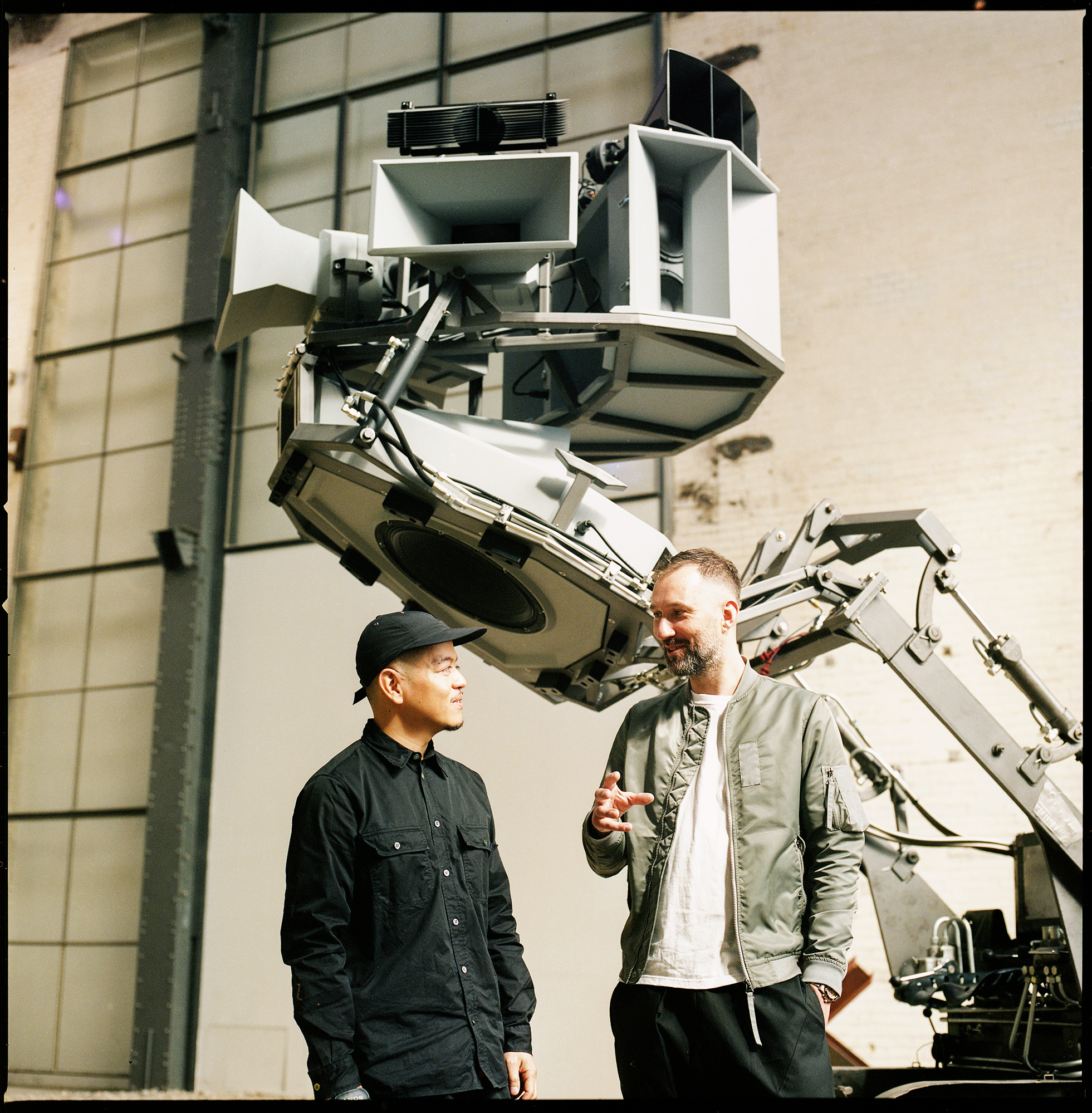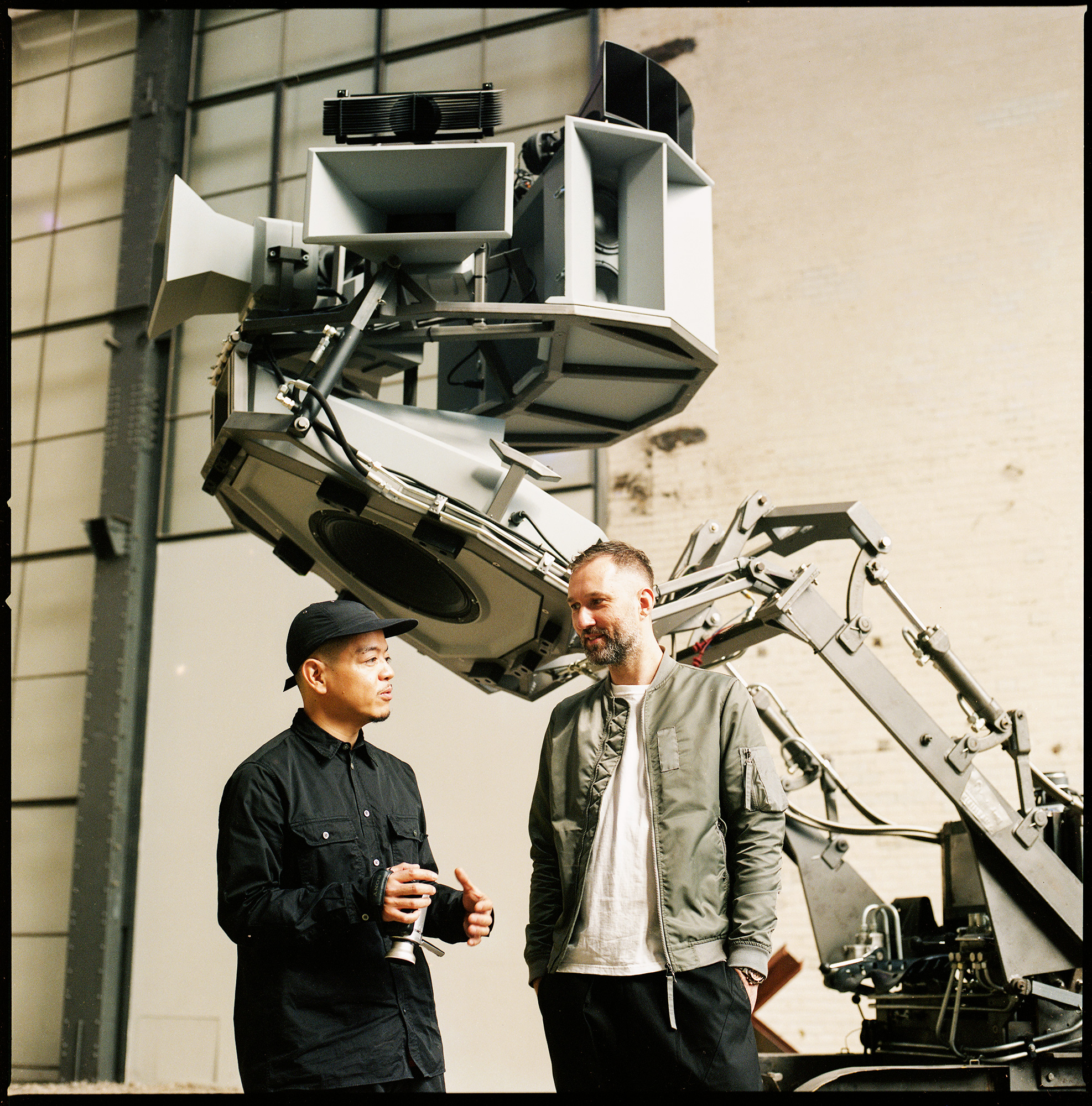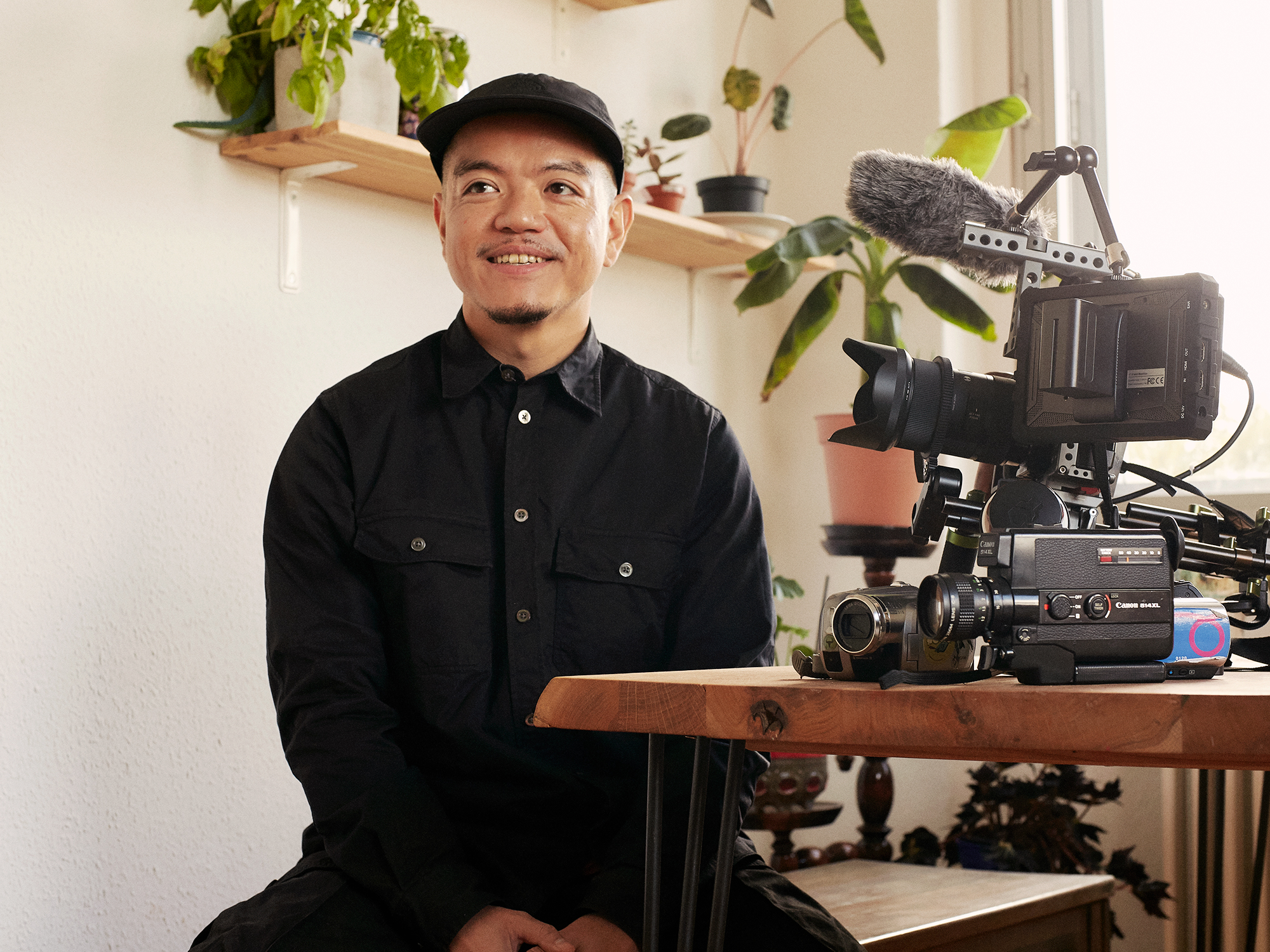For long, Japanese Videographer Hirō Tanaka has been following Nik Nowak’s work, a German artist who produces “Sound Tank” speakers inspired by the sonic weapons that were used during the Cold War. He has been working on countless music videos and documentaries for the music scene, such as London-based global music distribution platform “Boiler Room,” and experimental music festival “Berlin Atonal.” All of his creations find their roots in music, binding them all together. He moved from London to Berlin, where he continues to capture and document the local culture, and at the same time, unknown music cultures hidden in different corners of the world. In this interview, I asked Hirō his opinions as a Japanese creator living overseas.
While walking around Kreuzberg, Berlin’s district remnant of former East Germany, Hirō tells us about the city’s culture, from Nik Nowak’s installation “Schizo Sonics,” currently showcased at the KINDL Centre for Contemporary Arts, to Berlin Atonal’s venue “Kraftwerk.” I am pleased to present this interview as a sort of side story to the “Berlin Art Week.”
――I heard that your encounter with Nik Nowak was your reason to move to Berlin. Can you tell us some details?
Hirō: When I lived in London, I learned about Nik through Kode9(*), which I was collaborating with, and I was impressed by his work. “What’s this?!” I thought. Then, when I moved to Berlin, I happened to run into him on my way home from the club, so I asked him if it was really him, and while completely drunk, we started talking (laughs). That was the first time I met him, and that’s when I thought I wanted to work with him someday. Nick doesn’t just use speakers as art tools; he is also researching the very impact that frequencies of sound have on human beings. His works look cool, but it’s not just that: he is the kind of artist who also follows the history of both East and West Berlin’s sonic weapons, taking a researcher-like approach. That is what left a deep impression on me.
(*): Kode9 a.k.a Steve Goodman is a Scottish electronic music artist, DJ, and founder of the record label Hyperdub.
――When you lived in London, were you working on video production for music-related projects?
Hirō: I’ve lived in London since 2009. I’ve always loved music since I was little, and I’ve been active as a DJ since I was a teenager, but I started video production as an extension of that. In Japan, when I was an art college student, I made a documentary about the homeless community in Sanya, but that was in my own style, and I only started being involved in music videos professionally when I moved to London. While working day-labor and part-time jobs, I would bring my Handycam and record footage of clubs. That’s when I started making music videos for wonderful musicians and labels that I met there, such as Eglo Records, Ninjatune, and Hyperdub.
――So you started with music too, just as I thought. Your long-awaited dream of working with Nik has been realized in various ways, but how was it to actually work together?
Hirō: In 2016, Nik performed a sound demonstration by the name of “Sound is the Weapon of the Future” to raise awareness towards peace, themed after afrobeat artist Fela Kuti’s famous quote. I was searching for a platform that would use the footage that I took at the time, and a Japanese music media called Lute picked it up. That video was my very first collaboration with him. After that, Nik had his work exhibited for “Art Basel” in Miami Beach thanks to the support of Sennheiser, for whom he does audio supervision, so I went to Miami with him. There is a subgenre of UK bass music called Miami bass, which originated from 80s Hip hop, and Nik played that through his Sound Tank (speaker-wall made by Nik) for that event. The event itself was a showdown between the Sound Tank and a custom station wagon made into a speaker by a local legendary DJ. We actually had to put that huge piece of work on a ship to bring it there (laughs). Nik is a critically acclaimed artist in the audio industry, so he gets invited to events of all sorts of genres. Miami bass is a music genre that expresses sexuality in a straight manner, and it is completely different from the Berlin scene that I am used to, so it was very interesting.
From there, he started making a second sound tank, so we talked about making a documentary, which ended up becoming this video. Although for various circumstances, it has become a short film, the work itself known as “The Mantis,” which was completed in 2019 and is currently on display, was also showcased for Berlin’s CTM Festival. The installation went really well for this year’s Art Week despite the corona pandemic, and the KINDL – Centre for Contemporary Arts looks like it was made especially for Nik. We are currently talking about making a long version of this video.
――Besides working with Nik, you moved to Berlin and immediately started working with Boiler Room, and every year as a film crew member of Berlin Atonal, right? I don’t think many Japanese people are picked for those kinds of jobs; what do you think about that?
Hirō: For Boiler Room, one of the crew members took a liking to the music videos I used to make when I was in London, and initially I was working for them as an outsourced videographer. From there, I started producing a documentary show for Boiler Room and became involved as a director. I don’t really have any particular feelings toward doing this job as a Japanese person, but I consider myself a lucky person for the help I get from the people around me. When I started working for Boiler Room, my job consisted of mostly one-day trips and direct interviews, so I didn’t have time to deeply get to know the people I met. Despite that, going to different parts of the world and capturing through film the energy of parties that only exists in that time and place was a precious experience.
――Are there any places or works that left a particular impression on you?
Hirō: The time I went to “Chico Records,” the oldest record shop in Beirut, Lebanon. I heard that the recent explosion there barely caused any damage, but I think it’s truly amazing that they continue their business as a record shop even under such circumstances. Also, the party held at Georgia’s top club “Bassiani” was very impressive. It was immediately after the end of the civil war, and the enthusiasm binding together all of the young people who were previously oppressed was amazing.
――The name “Bassiani” apparently comes from the “Battle of Basian” which happened in the 13th century, and I understand the club was unreasonably investigated by the police in 2018; at the time, many artists from all over the world stood up to support the club, which shows how remarkable is the passion towards club culture. What about Berlin Atonal, which is by many considered a bizarre festival?
Hirō: After I’ve started living in Berlin, I’ve always wanted to shoot Berlin Atonal, which I have been doing every year since 2016. I was introduced through a work-related acquaintance, and I heard that they were looking for a video editor, but when I went to the meeting, I was suddenly appointed as director (laughs). In my first year working for Atonal, the commission was last minute, and they asked me to make something experimental to match the contents of the festival. Even though it was a commission, they gave me carte blanche from the beginning, so it was the kind of job where we built it up together after the shooting. However, from the second year on, I decided to just go for whatever I like, so I asked Shinya Katō, a cameraman who I still work with, to join me and form a powerful camera crew ready for the job. Atonal is not only considered a bizarre festival, but it also goes on for five days, and every time it’s often tiring and hard to pull off, but thanks to the camera crew, we still make it happen. I am also grateful to the organizers’ free spirit and their trust in my abilities, even though I do as I please.
――You also worked with Katō-San on Nik’s work, right? I think Atonal is important to many because there aren’t a lot of festivals in Europe where Japanese people and artists are hired. I myself have the chance to write articles and interviews for Atonal, which is a symbol of Berlin’s club scene, and there is no better venue for experimental music than Kraftwerk.
Hirō: I think so too. I got to know Katō-Kun through a friend, but more than anything else, he is a highly skilled and trustworthy cameraman. Atonal was actually born in the 80s mainly as a punk and noise music festival, a symbol of freedom; I think it’s interesting how it came to be about techno and experimental music in modern times. The organizers aren’t just doing festivals, but also documentaries, and summer-themed events for the day summertime begins, which is very interesting. We are doing a project called “Lost Rhythms,” which consists of recording various disappearing music cultures in collaboration with European musicians. In February, I went to Senegal with the crew to interview a family of sabar drum artists. The sabar is a kind of traditional drum, and the artists themselves are people with duties similar to the ones of Japanese monks or Evangelist missionaries whose traditional drumming patterns haven’t been recorded so much, despite their historical value. We are still working on this project where we go and record video and audio footage of such people.
――That is an incredibly interesting project! I think it’s because there are people on the front lines who are always on the lookout for undiscovered music cultures around the world. How do you feel, being a member of the crew?
Hirō: I have a very reliable and friendly relationship with Atonal organizers’ team members Harry Grass, Laurens Von Oswald, and Paulo Reachi, and together we decide stuff like video direction, so I don’t consider them to be just my clients. Work in Berlin often begins after everyone strongly agrees on the concept and subject; I think that things like skill and speed are of course important too, but being able to share ideas and sympathize with each other is crucial to me. I don’t have any special abilities, and my language skills aren’t that great, so I focus on how to deepen communication and shared sensibility. Therefore, when I work with someone new, even if I feel that we come from different cultures or that we don’t share the same sensibility, I try to forget about my ego or what I want to convey at first and focus on how to broaden the conversation with my knowledge or find common ground.
――Communication skills, which are said to be lacking in Japanese people, are an absolute necessity not only for creative work but also for interacting with people from different countries. You have been to various countries; what do you think about Berlin?
Hirō: I see Berlin as some kind of a test site: It’s easy for artists to rent large studios, and there are environments in which it is possible to create large-scale artworks like Nik’s. When I shot the first documentary, I thought it was wonderful that there was a place where one could privately create physical and suggestive art that isn’t just an article, a painting, or a video, but that can be as big as a sculpture. I think that Berlin is an extremely valuable city: its history of war is still very present and can be felt very realistically, but it’s a shame that the number of such places is decreasing.
――Recently, there have been various cultural issues in Berlin, from sky-rocketing rents to gentrification. In addition to that, the coronavirus has become a major threat. I am quite worried about what will happen to various cultures all over the world, not just in Berlin.
Hirō: I really think so. Like Kraftwerk, the main venue for Atonal, there are a lot of facilities that haven’t been used because of the coronavirus, and I really don’t know what will happen if this continues for a year. Since the fall of the wall, Berlin has maintained its cultural originality in art and music, with very little influence from capitalism; it’s a rare city. Many people migrate from overseas because they’re attracted to this, making this time in Berlin incredibly precious, but due to the pandemic, it seems that only big companies have been able to grow. Shooting for Boiler Room has brought me to various countries, and I realized how truly characteristic Berlin is. Its political strength is unique, and it’s an experimental place, not bound by any pre-existing formats. There is a feeling you forget by living in big cities, and here in Berlin I’ve been reminded of such a sensation; as long as that exists, I think it’s going to be fine.
――In recent times, the future of the world has truly become uncertain, but I think it’s very important to protect the survival of music and other cultures. Under such circumstances, I think that jobs such as yours, where data is recorded for posterity in video form, will become more and more valuable.
Hirō: Because of the virus there are fewer jobs, so what can I do about it? When I think about that, I know that I have the choice to do a completely different job from the physical labor I used to do back in the days, but what I am asked to do now is also completely different from what I’d really like to do. I’ve always liked music, so I used to make music videos to earn my bread until I was socially allowed by more and more people to gradually turn video production into my job. That is why I think it’s essential to create something with a strong message, even if not many people will see it. During my childhood, I could never adapt to the pressure to conform that is present in Japanese schools, but I was saved by skateboard and hip hop videos; there are others like me, and I am proud to be making videos that can catch such people’s attention, giving them an opportunity to think. Some things only exist in the moment and quickly vanish, so I think they’re valuable and have to be recorded for posterity. Videos have given me hope and different values; I believe the power of video to be amazing. It can be archived for a long time, and I hope that even just one of my work will become something of such importance, so I’d like to keep doing my job in the future as well.
Hirō Tanaka
Born in Tokyo, 1983. Videographer and DJ. He started his activity as a DJ, as well as his career in video production in Tokyo, and decided to move to England in 2009 after experiencing European sound systems during his trips. In London, he started filming local musicians with his Handycam. He then moved to Berlin in 2014 and began working for Boiler Room Berlin as a videography director. He currently works as a freelance videographer and director for Berlin Atonal, Native Instruments, Nyege Nyege Tapes, Boiler Room / 4:3, etc. His goal is to record what meets his eye for posterity, and he is currently producing documentaries about Senegalese music culture and Berlin artists.
Photography: Hinata Ishizawa
Translation Leandro Di Rosa




